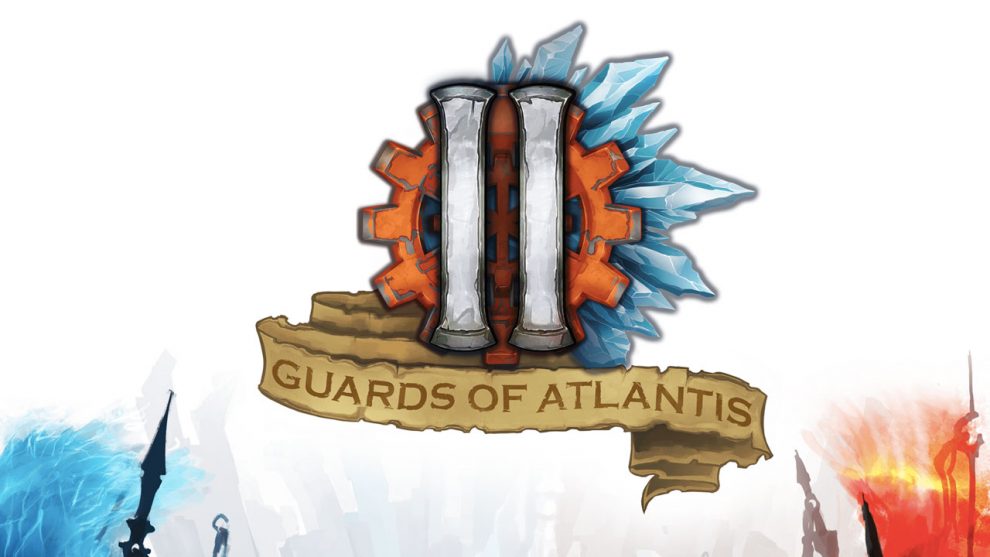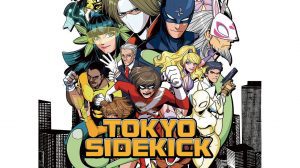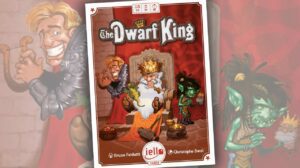A few years ago, I wrote a review of the first Guards of Atlantis on BoardGameGeek. I don’t recall how I found out about this game but I became somewhat obsessed with it to the point where I made a custom mod for Tabletop Simulator with my limited knowledge and managed to get my name scribbled onto the back of the rule book as a playtester. I was also the idiot that pushed the “quick play” variant into the original game due to my whining about how slow the game can be on Skype. Good old days.
Now we are looking at a sequel to the game that not only adds new characters but reforms the boys and girls of old Guards of Atlantis. These alterations are to accommodate the changes to the meta presented in the sequel. To put it bluntly, this is a 2.0 of the original game and any fans of the original should nab the upgrade kit on Kickstarter because these changes are a definite improvement. Here’s a small teaser for now: mechanisms for leveling faster and death being less painful. Ready for more? Then let’s jump in.
Multiplayer Online What?
For those of you who never heard of Guards of Atlantis, this game is a MOBA. MOBA stands for Multiplayer Online Battle Arena. The origins of this genre come from computer games such as League of Legends and DOTA2. These two computer games not only have a huge following behind them but have televised competitive events with millions of dollars on the line.
This popularity is driven by how these games are designed. They are team-based games with each player controlling an individual character in that team. Each character has their unique powers and players have a choice of dozens of characters to form their team. Your task is simple: Destroy the other team’s base. You will do this by pushing alongside your autonomous minions towards the enemy base and it will involve various violent activities such as defeating enemy heroes, destroying defensive towers, and killing off their minions. Throughout the match, you will gain items and level up your character to become more powerful.

As you can tell, the concept above sounds complicated and competitive, which is why I am impressed on how Guards of Atlantis manages to encapsulate these elements without ridiculous compromises that I have seen in many other tabletop MOBAs out there.
With all this being said, let’s talk about the game itself. There are three ways to win in Guards of Atlantis.
- The classic way is to destroy your opponent’s base by eliminating your opponent’s minions in each battle area leading towards them without being pushed back.
- Make the opposing team run out of spawn tokens and these tokens are depleted each time an opposing hero dies.
- The less exciting option is winning via a time limit. Once there are five pushes, whoever won the last push wins the game.
I’m sure some of you are confused by the concept of “pushing” since this is jargon from MOBAs. Pushing refers to minions moving forward and the battle area as mentioned above refers to the section of the board where the minions reside. Minions do not attack players and when they are attacked, they are automatically defeated. When a team loses all of their minions in a battle area, the battle area moves towards the losing side and all minions respawn in the next area, thus causing a reset. This movement is called a “push.”
To defeat these minions, you need to play your cards. You start with a hand of five cards related to your character of various colors. Think of these colors as “slots” such as your Red card for your ‘strong attack’, yellow cards as your high initiative basic card, and so forth.

Each card will have several features on it. You have your initiative value at the top left corner while your secondary actions are on the left side. At the bottom card of the card shows your card’s main action such as an attack, movement, skill, or defense.
A round consists of four turns. Each turn, you will place one of your cards face down on the board and once everyone has done this, the cards are revealed, and players will do their actions from the highest to lowest initiative. After your action is completed, you cannot use the card again for the rest of the round. Once the round is over, the discarded cards will go back into your hand.
Calculated Beatdown
Now is where the first layer of the game’s intricacies begins to expose itself. While you are committed to playing your card, you are not committed to your intentions. For a brief scenario, if the purpose of my red card was to attack you, but you moved out of the way since you played a higher initiative card, I can respond by simply using my red card’s secondary movement value instead. It just gives enough restrictions where misplays are punished, but it isn’t so airtight that you suffocate.
Speaking of attacking, I can’t think of any other words besides “genius” to describe the combat system. To attack, you would play your attack card and tell the targeted player the attack value of your card. The target must then play a defense card from their hand that is equal or higher than your attack. If they succeed, no repercussions occur and all is well in the world. Failure to do so, they die and their team must spend spawn tokens to bring them back. There are no hit points here. It is an all-or-nothing affair with no randomized elements.

The only drawback I see with this entire system is that it’s very methodical and slow. Players who prefer a flexible system that would have allowed them to do numerous actions on their turn will be annoyed by this. In Guards of Atlantis, get used to it. Your first turn is going to play a card to allow you to move into position then your second turn is an attempt to attack your target by playing another card. I prefer a flexible system but I like the sheer amount of player agency that is given here since it makes each kill feel like it was earned, thanks to the multi-step process involved.
Another trait of MOBAs is leveling and how it is handled here is interesting. Gold is earned by defeating minions and heroes. At the end of the round, everyone has a chance to level up their character by spending their gold. When they level up, they pick a color they want to upgrade to the next tier (ex: Blue skill Tier 1 to Tier 2) and take both cards of that color and tier. The intriguing aspect here is that you are swapping your old card for the new one, and for the second card you didn’t pick will give you a passive upgrade based on the white icon at the bottom of the card, such as increased defense or movement. This permanent upgrade is a boost to all cards you have in your hand, so it is possible to cater to a certain style, for instance, high movement or a mix of initiative and attack boosts. There are 3 tiers of cards and the final upgrade being an “Ultimate” card that is a game-changing passive effect designed to end the game quickly.
Some of you might have caught that I said two colored cards when you level up. The first card is always an upgraded version of your original card while the second one is an alternative and when I say alternative, I don’t mean a slight variation. These substitute cards can be such a drastic change that they modify the core concept of the character. To give one example, Brogan the elf barbarian. Yes, you’ve read that right. He likes to spend his evenings charging at enemies to show them his new axe while being hard to kill. His alternative skill set allows him to stab people from a distance by throwing spears at them and arming himself with support skills to help his minions. That’s just 1 character out of 22. If you are concerned about replayability, don’t be.

Competitive Teamwork
Despite the growth of board games for the past few years, competitive team games outside of the “party game” label are just as rare as a leprechaun riding a unicorn. Sure, collaboration between players isn’t new but what makes Guards of Atlantis work is the emphasis on chemistry and teamwork.
Even before the game starts, you and your teammates will be drafting a team of characters to come up with a good synergy and a goal. The three objectives mentioned previously means various viable team compositions can come into play from hero hunting lineups to defensive push masters. To throw a bit of spice into this, players may openly communicate with each other before the cards are face down, but once the cards are face up, no communication. While this is might annoy some board games, it does simulate what tends to happen in a MOBA game due to miscommunication or poor positioning thanks to teammates not having their priorities aligned with each other.
I’m sure there might be a few of you who are racing for your credit card for this game but I have to wave the yellow flag here.
Not A One-Shot Game
This is a lifestyle game in every sense of the word. If Gloomhaven is for co-op dungeon crawl freaks and Blood on the Clocktower is for compulsive liars, this game is for the competitive crowd. To get the full enjoyment of this game, you need a committed group of players who are willing to savor this feast with you. To even play at a mediocre level, you need to understand the matchups and skills of not just your character, but the other characters on the board. Due to the competitive team play aspect, something that is very rare in board games nowadays, having a huge skill gap between players might cause some ire among the table. This game is not designed for simple one-shot games for first-timers.
The other point I want to point to is the competitive aspect. As someone who was raised by PC gaming, I am fine with this but we are an industry where the most popular games are family-friendly like Ticket to Ride and Settlers of Catan. This game will body slam you to the dirt for mistakes and your response better be to smile. It’s not a forgiving game.
Outside of these lifestyle concerns, I do have some genuine criticism.
Guards of Atlantis does an amazing job at emulating the trapping of a MOBA, including the tedious and slow nature of MOBAs. This game will take two hours and this is coming from a guy whose name is listed as a playtester in the first game. If you have players who will psychoanalyze every detail, this two-hour mark will be blown through and you might end up a zombie by the end of the night. It is a game designed to be slow-paced with a very systematic approach to every detail.
Another issue I have, although this is more related to the first Guards of Atlantis, are the components. The miniatures are fine but the clarity is terrible. Your heroes need to stick out from the pack of over a dozen minions, however, everything is cast in grey. During my plays of the first Guards of Atlantis, there were various occasions where the player thought he was targeting a hero when he was targeting a minion instead. At the time of this writing, the Kickstarter hasn’t been launched, nonetheless, I hope Guards of Atlantis 2 develops a way to make it easier to separate the minions from the heroes either by different colored molds or some other visual method.
The final issue I have with the game is the card text itself. Much like the first version of Guards, some of the abilities written here often leave room for interpretation in edge-case situations. This can change when the final version is released, however, this was an issue during my experiences with the Tabletopia playtest version.
If the past 1800 words have you salivating, this could be the game for you. As a MOBA veteran and someone who played numerous tabletop variations of the genre, I wasn’t too impressed with what was presented out there. Guards of Atlantis, even with its slow deliberate gameplay, is the one MOBA board game that kept pulling me back since it captures the moments and decision making of a MOBA so accurately without complicated rules. I wish I had a committed group of players because I want to examine this gorgeous tapestry of mechanisms with them. If you already have a dedicated group of competitive players, seriously considering checking this out.











This review nails it. We’ve been playing via TTS and it is 1) awesomely awesome; 2) so hard to get friends into because of all the reasons you state. I’m an instant fan of your reviews now.